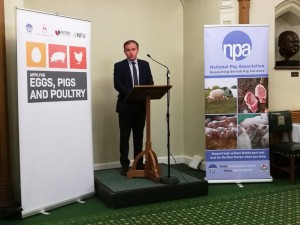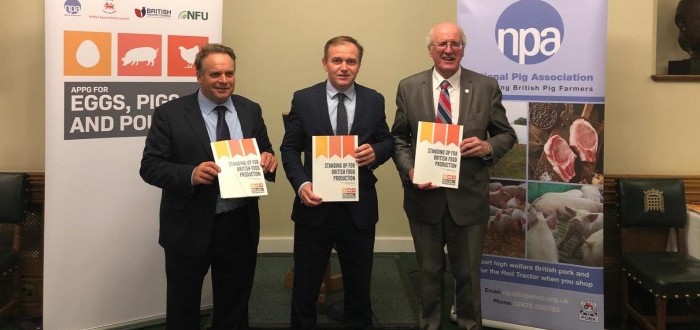Farming Minister George Eustice has sought to reassure the pig and poultry sectors about the Government’s position on allowing food produced to lower standards into the country after we leave the EU.
 Mr Eustice addressed a reception for the All-Party Parliamentary Group (APPG) for Eggs, Pigs and Poultry in the House of Commons on Monday night.
Mr Eustice addressed a reception for the All-Party Parliamentary Group (APPG) for Eggs, Pigs and Poultry in the House of Commons on Monday night.
In a wide-ranging speech, the Defra Minister addressed head on concerns raised across the farming industry that post-Brexit trade deals could result in the UK being flooded with imports of products produced using methods outlawed in this country.
He told the gathering, attended by MPs, industry leaders, farmers and representatives of the allied industries: “I could not be clearer that we will not water down our standards on animal and animal welfare in pursuit of a trade deal.”
He stressed that any future trade deal would have to come before Parliament, which ‘has the ability to block and veto trade deals if necessary’.
“No Government would entertain trade deals in the years ahead that will be able to disregard the concerns of Parliament in this area. In some issues, such as chlorine washed chicken or hormone-treated beef, it would require repeal of domestic legislation before such a course could even be entertained,” he said.
“Believe you me, as someone who has tried to get Statutory Instruments through Parliament, making changes of that sort is never easy.”
Labour concerns
Mr Eustice also addressed concerns about the future availability of EU labour, which he acknowledged was a critical issue across the three sectors. He acknowledged that the recent Migration Advisory Committee report did not contain ‘much comfort’ for certain sectors.
But he stressed that the MAC was just an advisory committee and that the Government would be setting out a White Paper on future immigration policy. He said the Government retained the option ‘to open the provision in Tier 3 (visas for low-skilled workers filling specific temporary labour shortages) should it want to and should it become necessary in the future’.
The Cornwall MP acknowledged the general air of uncertainty about our post-Brexit future within the agriculture sector. But he said progress was being made, too, notably with Defra’s publication of the ‘radical’ Agriculture Bill, which reached the committee onTuesday.
Mr Eustice tried reassure farmers that the ‘enhanced animal health and animal welfare’ element of the public goods agenda would not mean ‘more regulation and more people on their back’. He outlined how the policy could provide financial support for new pig buildings, for example, to help farmers adopt different approaches to livestock husbandry and for implementing measures not rewarded in the market that deliver higher welfare, improve animal health and reduce the need for antibiotics.
He said the Government was partly driven by a ‘growing public consciousness about animal welfare’, particularly prevalent among the Millennial generation. “We need to engage in that discussion. If we can be the first county to do something quite revolutionary and reward farmers to support animal husbandry that reduces overuse of antibiotics, improves animal welfare and reassures consumers that eating meat really is part of a healthy balanced diet, I think that is something we should engage with,” he said.
Report launch
The NPA, British Poultry Council, British Egg Industry Council and launched a report at the event highlighting the importance of the three sectors and the contribution they make to the economy. (EFRA chair and APPG member Neil Parish, George Eustice and APPG chair Jim Shannon are pictured with the report).
The meeting was also addressed by APPG chair Jim Shannon, from the DUP, who was bullish about Brexit and the opportunities it can bring, particularly in terms of export growth. He expressed concern, however, about the potential implications of reduced access to EU labour after we leave the EU.
Commenting on Mr Eustice’s speech, NPA senior policy advisor Ed Barker said: “It was encouraging to hear these words from the Minister and his recognition on what our unsubsidised sector is delivering for the UK consumer.
“It is good to see that new schemes under a future domestic agricultural policy, such as the animal health and welfare scheme, are going to be drawn in tandem with industry. They will also very much be opt in only and will not force producers to adopt certain measures.”




